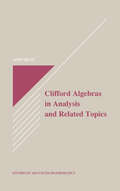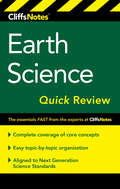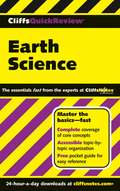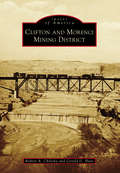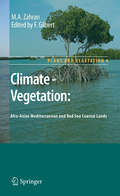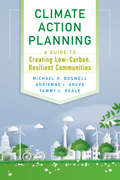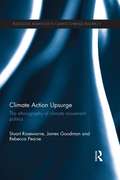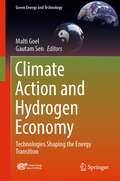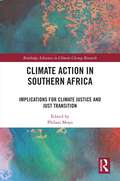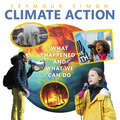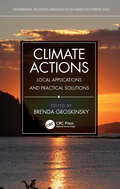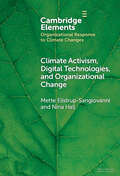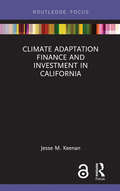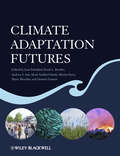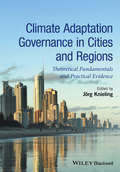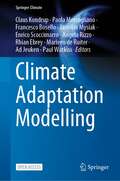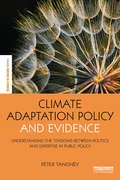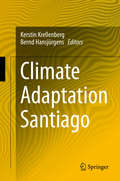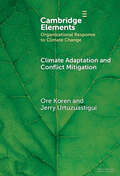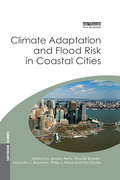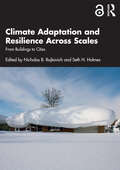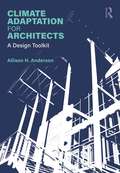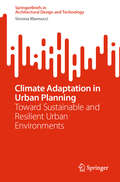- Table View
- List View
Click's Garden: An Interview with Rose
by Amy TaoClick the mouse learns all about plants from his garden flower, Rose.
Clifford Algebras and Lie Theory (Ergebnisse Der Mathematik Und Ihrer Grenzgebiete, 3 Folge/a Series Of Modern Surveys In Mathematics Ser. #58)
by Eckhard MeinrenkenThis monograph provides an introduction to the theory of Clifford algebras, with an emphasis on its connections with the theory of Lie groups and Lie algebras. The book starts with a detailed presentation of the main results on symmetric bilinear forms and Clifford algebras. It develops the spin groups and the spin representation, culminating in Cartan's famous triality automorphism for the group Spin(8). The discussion of enveloping algebras includes a presentation of Petracci's proof of the Poincaré-Birkhoff-Witt theorem. This is followed by discussions of Weil algebras, Chern--Weil theory, the quantum Weil algebra, and the cubic Dirac operator. The applications to Lie theory include Duflo's theorem for the case of quadratic Lie algebras, multiplets of representations, and Dirac induction. The last part of the book is an account of Kostant's structure theory of the Clifford algebra over a semisimple Lie algebra. It describes his "Clifford algebra analogue" of the Hopf-Koszul-Samelson theorem, and explains his fascinating conjecture relating the Harish-Chandra projection for Clifford algebras to the principal sl(2) subalgebra. Aside from these beautiful applications, the book will serve as a convenient and up-to-date reference for background material from Clifford theory, relevant for students and researchers in mathematics and physics.
Clifford Algebras in Analysis and Related Topics (Studies in Advanced Mathematics #21)
by John RyanThis new book contains the most up-to-date and focused description of the applications of Clifford algebras in analysis, particularly classical harmonic analysis. It is the first single volume devoted to applications of Clifford analysis to other aspects of analysis.All chapters are written by world authorities in the area. Of particular interest is the contribution of Professor Alan McIntosh. He gives a detailed account of the links between Clifford algebras, monogenic and harmonic functions and the correspondence between monogenic functions and holomorphic functions of several complex variables under Fourier transforms. He describes the correspondence between algebras of singular integrals on Lipschitz surfaces and functional calculi of Dirac operators on these surfaces. He also discusses links with boundary value problems over Lipschitz domains.Other specific topics include Hardy spaces and compensated compactness in Euclidean space; applications to acoustic scattering and Galerkin estimates; scattering theory for orthogonal wavelets; applications of the conformal group and Vahalen matrices; Newmann type problems for the Dirac operator; plus much, much more!Clifford Algebras in Analysis and Related Topics also contains the most comprehensive section on open problems available. The book presents the most detailed link between Clifford analysis and classical harmonic analysis. It is a refreshing break from the many expensive and lengthy volumes currently found on the subject.
CliffsNotes Earth Science Quick Review
by Scott RyanA quick‑in, quick‑out Earth Science study guide that includes subject review chapters and practice questions throughout CliffsNotes Earth Science Quick Review, 2nd Edition, provides a clear, concise, easy‑to‑use review of earth science basics. Perfect for middle school and high school students, as well as for anyone wanting to brush up on their knowledge of how the earth's systems function.Whether you're new to minerals and rocks, or motions of the earth, moon, and sun, or just wanting to refresh your understanding of the subject, this guide can help. Aligned to NGSS, it includes topics such as plate tectonics and mountain formation, weathering and erosion, and measurements and models of the earth. The target audience is substantial: Approximately 49% of the nation's 8th graders take an earth science course, and slightly over 17% of high school students take the course before graduating.
CliffsQuickReview Earth Science
by Scott RyanYour effective tutorial for mastering Earth ScienceWhy CliffsQuickReview Guides?Go with the name you know and trustGet the information you need--fast!Written by teachers and educational specialistsAbout the contents:The Earth's Structure* Earthquakes, tsunamis, and volcanoes* Oceans and features of the ocean floor* Earth's layers* Plate tectonics, hot spots and pole* Landscape formationreversal patterns* Rocks and minerals; rock and fossil datingClimate* Atmosphere, storms, and forecasting* Water and climate* Insolation and the seasons* Weathering and agents of erosionEnvironmental Concerns* Conservation* PollutionSpace* Comets, asteroids, and meteoroids* Motions of the earth, moon, and sun* Kepler's laws of planetary motion* Origin of the universeReview and Resources* Chapter-end quizzes* Comprehensive end-of-book quiz* Glossary of key terms* Appendix of topic-related resources and websitesWe take great notes--and make learning a snap
Clifton and Morenci Mining District
by Robert A. Chilicky Gerald D. HuntAcross America, from big cities to small towns and rural hamlets, there are many stories of challenges, historic events, courageous people, tragedy, and success. Some of the best and most exciting tales may not be well known. Such is the case for the towns of Clifton and Morenci, Arizona. They survived labor strikes, rising and falling copper prices, devastating floods, outlaws and lawlessness, gambling houses, and saloons. All this added to the lore that these towns were some of the roughest communities in the West. Today, after 143 years of mining, Freeport-McMoRan's Morenci copper mine is the largest in North America. Expansion has required new homes in Clifton-Morenci, a modern library, and recreational facilities. Residents are proud of their communities.
Climate - Vegetation: Afro-Asian Mediterranean and Red Sea Coastal Lands (Plant and Vegetation #4)
by M. A. Zahran Francis GilbertDeserts are unique ecosystems with their own biotic and abiotic components, and are often rich in renewable natural resources, the appropriate management of which can contribute significantly to the sustainable management of desert regions for the welfare of the people. Yet while there are many books on the flora of the countries fringing the important desert countries of the Mediterranean and Red Seas, there or few books reporting on their ecophysiology and vegetation ecology. This book presents the vegetation types of the African and Asian countries of the Mediterranean and Red Sea coastal regions, and discusses the ecological threats and economic applications of these critical resources. In particular, it examines the relationships between climate and vegetation, and discusses these within the context of desertification, agro-industrial applications, ecotourism and sustainable development. The book will provide a valuable reference for researchers and graduate students involved in plant ecology, biogeography, economic botany and environmental management in the Afro-Asian Mediterranean and Red Sea coastal regions, as well as other desert regions around the world.
Climate Action Planning: A Guide to Creating Low-Carbon, Resilient Communities
by Michael R. Boswell Adrienne I. Greve Ms Tammy L. SealeClimate change continues to impact our health and safety, the economy, and natural systems. With climate-related protections and programs under attack at the federal level, it is critical for cities to address climate impacts locally. Every day there are new examples of cities approaching the challenge of climate change in creative and innovative ways—from rethinking transportation, to greening city buildings, to protecting against sea-level rise. Climate Action Planning is designed to help planners, municipal staff and officials, citizens and others working at local levels to develop and implement plans to mitigate a community's greenhouse gas emissions and increase the resilience of communities against climate change impacts. This fully revised and expanded edition goes well beyond climate action plans to examine the mix of policy and planning instruments available to every community. Boswell, Greve, and Seale also look at process and communication: How does a community bring diverse voices to the table? What do recent examples and research tell us about successful communication strategies? Climate Action Planning brings in new examples of implemented projects to highlight what has worked and the challenges that remain. A completely new chapter on vulnerability assessment will help each community to identify their greatest risks and opportunities. Sections on land use and transportation have been expanded to reflect their growing contribution to greenhouse gas emissions. The guidance in the book is put in context of international, national, and state mandates and goals. Climate Action Planning is the most comprehensive book on the state of the art, science, and practice of local climate action planning. It should be a first stop for any local government interested in addressing climate change.
Climate Action Upsurge: The Ethnography of Climate Movement Politics (Routledge Advances in Climate Change Research)
by James Goodman Rebecca Pearse Stuart RosewarneIn the late 2000s climate action became a defining feature of the international political agenda. Evidence of global warming and accelerating greenhouse gas emissions created a new sense of urgency and, despite consensus on the need for action, the growing failure of international climate policy engendered new political space for social movements. By 2007 a ‘climate justice’ movement was surfacing and developing a strong critique of existing official climate policies and engaging in new forms of direct action to assert the need for reduced extraction and burning of fossil fuels. Climate Action Upsurge offers an insight into this important period in climate movement politics, drawing on the perspectives of activists who were directly engaged in the mobilisation process. Through the interpretation of these perspectives the book illustrates important lessons for the climate movement today. In developing its examination of the climate action upsurge, the book focuses on individual activists involved in direct action ‘Climate Camps’ in Australia, while drawing comparisons and highlighting links with climate campaigns in other locales. The book should be of interest to scholars and researchers in climate change, environmental sociology, politics, policy and activism.
Climate Action and Hydrogen Economy: Technologies Shaping the Energy Transition (Green Energy and Technology)
by Gautam Sen Malti GoelThis book focuses on up-to-date progress on the current status of technology and progress in climate action and hydrogen energy in India. It includes contributions from leading experts, and covers emerging topics such as issues & challenges in moving toward hydrogen economy, green hydrogen production technologies, hydrogen production from liquid hydrogen carriers, policy perspectives on hydrogen as energy source of the future, hybrid approaches for solar hydrogen, among others. This book is of interest to those working in academia, industry and policymakers in the field of energy.
Climate Action in Southern Africa: Implications for Climate Justice and Just Transition (Routledge Advances in Climate Change Research)
by Philani MoyoUsing climate justice as an analytical tool, this volume examines the role of local mitigation and adaptation actions in Southern African in furthering climate resilient development. Climate Action in Southern Africa examines the intrinsic connection between local climate actions, climate resilient development and strides towards a just transition. The theoretical grounding in climate justice allows the authors to analyze whether current climate actions in Africa are truly effective for the poor and marginalized whose lives and livelihoods are impacted by a climate crisis largely not of their making. The authors also question the extent to which pathways to net zero carbon emissions by 2050 are achievable in Africa and ask whether this can be attained without undermining livelihoods and human development. Overall, the book argues that for any transition to be a just transition it has to be aligned with the pursuit of sustainable development and climate justice for current and future generations on the African continent. Drawing out key factors including politics, gender and migration, this volume will be of great interest to students and scholars of climate change, climate justice and African development.
Climate Action: What Happened and What We Can Do
by Seymour SimonMeet the young activists who are using their voices and minds to fight climate change. Did you know that the past five years have been the hottest ever recorded? Or that over seven million people participated in the global Climate Strike? We’re facing a very real problem, but there’s hope. Everyone is affected by climate change. Reading Climate Action: What Happened and What We Can Do is the perfect introduction not only to the dramatic effects of climate change, but to the solutions. Learn how our behavior and actions have led us to this point, hear from kids around the world dealing with extreme storms, wildfires, and sea level rise, and discover what scientists, youth activists, and ordinary citizens are doing to protect their communities. Divided into eight sections for easy browsing and with over fifty photographs, captions, charts, and graphs, this nonfiction book is an excellent choice to share in the classroom and for homeschooling for kids ages 6 and up. Also includes a glossary to supplement the text, author’s note, and index. Climate Action is the latest of Seymour Simon’s nonfiction science books. His books are regularly honored by the National Science Teacher's Association.
Climate Actions: Local Applications and Practical Solutions (Environmental and Societal Dimensions of Sustainable Development Goals)
by Brenda GroskinskyThis book offers a diverse set of solid concerted strategies in the development and implementation of specific "climate actions," in natural and built places where we all live. The book also serves as a conduit of knowledge for those who are unsure on how they can make a difference for their families, their communities, and the natural places that surround them. Through many actionable examples of mitigation efforts for the ever-present effects of climate change, especially for those who may not understand the wide range of climate action opportunities that are available. Scientists, academics, and community leaders, will find concrete examples on how they too, can develop and implement climate action solutions.
Climate Activism, Digital Technologies, and Organizational Change (Organizational Response to Climate Change: Businesses, Governments)
by Mette Eilstrup-Sangiovanni Nina HallNon-governmental and civil society organizations have long been recognized as crucial players in climate politics. Today, thanks to the internet, social media, satellite, and more, climate activists are pioneering new organizational forms and strategies. Organizations like Fridays for Future, 350.org, and GetUp! have used social media and other digital platforms to mobilize millions of people. Many NGOs use digital tools to collect and analyze 'big data' on environmental factors, and to investigate and prosecute environmental crimes. Although the rise of digitally based advocacy organizations is well documented, we know less about how digital technologies are used in different aspects of climate activism, and with what effects. On this basis, we ask: how do NGOs use digital technology to campaign for climate action? What are the benefits and downsides of using technology to push for political change? To what extent does technology influence the goals activists strive for and their strategies.
Climate Adaptation Finance and Investment in California (Routledge Focus on Environment and Sustainability)
by Jesse M. KeenanThis book serves as a guide for local governments and private enterprises as they navigate the unchartered waters of investing in climate change adaptation and resilience. This book serves not only as a resource guide for identifying potential funding sources but also as a roadmap for asset management and public finance processes. It highlights practical synergies between funding mechanisms, as well as the conflicts that may arise between varying interests and strategies. While the main focus of this work is on the State of California, this book offers broader insights for how states, local governments and private enterprises can take those critical first steps in investing in society’s collective adaptation to climate change.
Climate Adaptation Futures
by Daniela Guitart Jean Palutikof Andrew J. Ash Sarah L. Boulter Marie Waschka Mark Stafford Smith Martin ParryAdaptation is the poor cousin of the climate change challenge - the glamour of international debate is around global mitigation agreements, while the bottom-up activities of adaptation, carried out in community halls and local government offices, are often overlooked. Yet, as international forums fail to deliver reductions in greenhouse gas emissions, the world is realising that effective adaptation will be essential across all sectors to deal with the unavoidable impacts of climate change. The need to understand how to adapt effectively, and to develop appropriate adaptation options and actions, is becoming increasingly urgent. This book reports the current state of knowledge on climate change adaptation, and seeks to expose and debate key issues in adaptation research and practice. It is framed around a number of critical areas of adaptation theory and practice, including: Advances in adaptation thinking, Enabling frameworks and policy for adaptation, Engaging and communicating with practitioners, Key challenges in adaptation and development, Management of natural systems and agriculture under climate change, Ensuring water security under a changing climate, Urban infrastructure and livelihoods, and The nexus between extremes, disaster management and adaptation. It includes contributions from many of the leading thinkers and practitioners in adaptation today. The book is based on key contributions from the First International Conference on Climate Change Adaptation ‘Climate Adaptation Futures’, held on the Gold Coast, Australia, in June 2010. That three-day meeting of over 1000 researchers and practitioners in adaptation from 50 countries was the first of its kind. Readership: The book is essential reading for a wide range of individuals involved in climate change adaptation, including: Researchers, Communication specialists, Decision-makers and policy makers (e.g. government staff, local council staff), On-ground adaptation practitioners (e.g. aid agencies, government workers, NGOs), Postgraduate and graduate students, and Consultants.
Climate Adaptation Governance in Cities and Regions: Theoretical Fundamentals and Practical Evidence
by J Ouml Rg KnielingGlobal climate change creates new challenges in particular for cities and regions. As centres of human activity they are especially vulnerable to climate change impacts. Adapting to a changing climate requires dealing with multiple uncertainties and complexity in order to allow proactive action. Therefore, cities and regions around the globe face the challenge of exploring flexible and innovative forms of governance which have to address specific local or regional vulnerabilities and build capacity to accommodate future change. This raises questions about the roles of stakeholders, the involvement of citizens, the composition and use of formal and informal instruments as well as the implementation of different forms of organization and regulation at the local and regional level. This book provides case studies from cities and regions all around the world. It analyses climate change adaptation from a perspective of organizing, administering and implementing local and regional adaptation strategies and measures. It looks into actors, actor-constellations, institutions and networks of climate adaptation. And, it provides the reader with knowledge about good practices and experiences to be transferred for solving adaptation challenges in cities and regions around the globe.
Climate Adaptation Modelling (Springer Climate)
by Jaroslav Mysiak Claus Kondrup Paola Mercogliano Francesco Bosello Enrico Scoccimarro Angela Rizzo Rhian Ebrey Marleen De Ruiter Ad Jeuken Paul WatkissThis open access book focuses on an issue only marginally tackled by this literature: the still existing gap between adaptation science and modelling and the possibility to effectively access and exploit the information produced by policy making at different levels, international, national and local. To do so, the book presents the proceedings of a high-level expert workshop on adaptation modelling, integrated with main results from the “Study on Adaptation Modelling” (SAM-PS) commissioned by the European Commission's Directorate-General for Climate Action (DG CLIMA) and implemented by the CMCC Foundation – Euro-Mediterranean Centre on Climate Change, in collaboration with the Institute for Environmental Studies (IVM), Deltares, and Paul Watkiss Associates (PWA).What is the latest development in adaptation modelling? Which tools and information are available for adaptation assessment? How much are they practically usable by the policy community? How their uptake by practitioners can be improved? What are the major research gaps in adaptation modelling that needs to be covered in the next future? How? This book addresses these questions presenting the results of a study on adaptation modelling commissioned by the European Commission's Directorate-General for Climate Action (DG CLIMA) enriched by the outcomes of a high-level expert workshop on adaptation also part of the research. This book aspires to provide a useful support to academics, policy makers and practitioners in the field of adaptation to orient them in the expanding adaptation modelling assessment literature and suggest practical ways for its application. This book, mainly addressed to academics, policy makers and practitioners in the field of adaptation, aims to providing orientation in the large and expanding methodological/quantitative literature, presenting novelties, guiding in the practical application of adaptation assessments and suggesting lines for future research. This open access book focuses on an issue only marginally tackled by this literature: the still existing gap between adaptation science and modelling and the possibility to effectively access and exploit the information produced by policy making at different levels, international, national and local. To do so, the book presents the proceedings of a high-level expert workshop on adaptation modelling, integrated with main results from the “Study on Adaptation Modelling” (SAM-PS) commissioned by the European Commission's Directorate-General for Climate Action (DG CLIMA) and implemented by the CMCC Foundation – Euro-Mediterranean Centre on Climate Change, in collaboration with the Institute for Environmental Studies (IVM), Deltares, and Paul Watkiss Associates (PWA).
Climate Adaptation Policy and Evidence: Understanding the Tensions between Politics and Expertise in Public Policy (The Earthscan Science in Society Series)
by Peter TangneyEvidence-based policymaking is often promoted within liberal democracies as the best means for government to balance political values with technical considerations. Under the evidence-based mandate, both experts and non-experts often assume that policy problems are sufficiently tractable and that experts can provide impartial and usable advice to government so that problems like climate change adaptation can be effectively addressed; at least, where there is political will to do so. This book compares the politics and science informing climate adaptation policy in Australia and the UK to understand how realistic these expectations are in practice. At a time when both academics and practitioners have repeatedly called for more and better science to anticipate climate change impacts and, thereby, to effectively adapt, this book explains why a dearth of useful expert evidence about future climate is not the most pressing problem. Even when it is sufficiently credible and relevant for decision-making, climate science is often ignored or politicised to ensure the evidence-based mandate is coherent with prevailing political, economic and epistemic ideals. There are other types of policy knowledge too that are, arguably, much more important. This comparative analysis reveals what the politics of climate change mean for both the development of useful evidence and for the practice of evidence-based policymaking.
Climate Adaptation Santiago
by Bernd Hansjürgens Kerstin KrellenbergThis book addresses the complexity of urbanization, impacts of climate change and climate change adaptation for the metropolitan region of Santiago de Chile, with a special focus on the most pressing issues of natural hazards, water and energy supply. The book exemplifies a conceptual approach for the development of adaptation measures, their evaluation and implementation in a decision support framework at the science-policy interface. It builds on scientific analyses of social and natural scientists, a participatory process with local authorities and a mutual learning network between large agglomerations in Latin America. The book is written for scholars of urban management, climate change, planning, governance and hazard research, as well as practitioners in local, regional and international organizations concerned with climate change, climate change impacts, and adaptation in metropolitan regions. While the regional focus is on Latin America the concepts and lessons learned are applicable and relevant to megacities around the world.
Climate Adaptation and Conflict Mitigation: The Case of South Sudan (Organizational Response to Climate Change: Businesses, Governments)
by Ore Koren Jerry UrtuzuastiguiAs climate change intensifies, conflict-prone tropical regions face heightened vulnerabilities, yet little is known about how climate adaptation and food security efforts affect conflict dynamics. Using South Sudan – a country highly susceptible to climate stress and conflict – as a test case, this Element analyzes how international nongovernmental organizations' (INGO) climate adaptation interventions influence civil war and local social conflicts. It develops a theoretical framework linking climate adaptation to conflict, positing both positive and negative externalities. Drawing on original high-resolution data on INGO-driven adaptation and food security efforts, alongside climate, conflict, and development data, findings are substantiated with interviews from policy workers in South Sudan. The results indicate that while adaptation generally does not reduce conflict, interventions that promote preparedness and are implemented during periods of high climate stress can mitigate social conflicts between militias, pastoralists, and farmers. These insights provide guidance for designing climate adaptation strategies that reduce conflict risks.
Climate Adaptation and Flood Risk in Coastal Cities
by Philip Ward Jeroen Aerts Wouter Botzen Malcolm Bowman Piet DirckeThis book presents climate adaptation and flood risk problems and solutions in coastal cities ? including an independent investigation of adaptation paths and problems in Rotterdam, New York and Jakarta. The comparison draws out lessons that each city can learn from the others. While the main focus is on coastal flooding, cities are also affected by climate change in other ways, including impacts that occur away from the coast. The New York City Water Supply System, for example, stretches as far as 120 miles upstate, and the New York City Department of Environmental Protection has undertaken extensive climate assessment not only for its coastal facilities, but also for its upstate facilities, which will be affected by rising temperatures, droughts, inland flooding and water quality changes. The authors examine key questions, such as: Are current city plans climate proof or do we need to finetune our ongoing investments? Can we develop a flood proof subway system? Can we develop new infrastructure in such a way that it serves flood protection, housing and natural values?
Climate Adaptation and Resilience Across Scales: From Buildings to Cities
by Nicholas B. RajkovichClimate Adaptation and Resilience Across Scales provides professionals with guidance on adapting the built environment to a changing climate. This edited volume brings together practitioners and researchers to discuss climate-related resilience from the building to the city scale. This book highlights North American cases that deal with issues such as climate projections, public health, adaptive capacity of vulnerable populations, and design interventions for floodplains, making the content applicable to many locations around the world. The contributors in this book discuss topics ranging from how built environment professionals respond to a changing climate, to how the building stock may need to adapt to climate change, to how resilience is currently being addressed in the design, construction, and operations communities. The purpose of this book is to provide a better understanding of climate change impacts, vulnerability, and resilience across scales of the built environment. Architects, urban designers, planners, landscape architects, and engineers will find this a useful resource for adapting buildings and cities to a changing climate.
Climate Adaptation for Architects: A Design Toolkit
by Allison AndersonArchitecture must adapt to protect people from the threat of climate change. About half of the world’s population lives in contexts that are highly vulnerable to climate change as hazards continue to intensify, with global disasters projected to reach 560 events per year by 2030, or 1.5 events every day. The accelerating frequency and intensity of disasters underscores the urgency to prepare for severe events to protect people, communities, and essential systems but also to protect the environment which provides shelter, livelihoods, cultural heritage, and public functions. This book provides a comprehensive reference of climate adaptation design tactics and a toolkit for adaptation to shocks and stresses, outlining the process for architects and designers to: Understand the risks posed by climate change to the built environment. Reduce the risks to people and the built environment from natural hazards. Reduce human vulnerability to shocks and stresses by strengthening resilience and adaptive capacity. Design the built environment to adapt to changes over its lifetime. Design buildings and cities to reduce dependence on fossil fuels. Preserve biodiversity and support natural resources. Climate Adaptation for Architects presents 45 adaptation tactics responding to the most consequential effects of climate change: heat, water, wind, and resource scarcity. Each chapter includes images, a definition, background information, key design considerations, potential impacts, and resources for further information. This is a valuable resource for every architect, landscape architect, urban planner, developer, and policymaker.
Climate Adaptation in Urban Planning: Toward Sustainable and Resilient Urban Environments (SpringerBriefs in Architectural Design and Technology)
by Simona MannucciThis book provides an overview of the current planning paradigms and technical strategies to cope with climate change, specifically flooding. Architecture and planning face the challenging task of designing the built environment while addressing complex issues in urban areas. Factors such as climate change, societal and economic issues and population growth can significantly impact the success of a plan. In order to plan for the future, adaptation and flexibility have become crucial. However, the traditional deterministic approach in planning allows no room for failure, expecting plans and projects to achieve desired objectives regardless of how the future unfolds. It also explores new planning paradigms, methods, and tools from other disciplines that can be integrated into urban planning to achieve long-term, flexible adaptation in the face of uncertain conditions (Decision Making Under Deep Uncertainty—DMDU). Additionally, a case study is presented, focusing on addressing uncertainties in a flood-prone area in Rome through scenario planning, combining various cutting-edge model-based methodologies drawn from DMDU. The target audiences are researchers and practitioners in architecture and urban planning.


